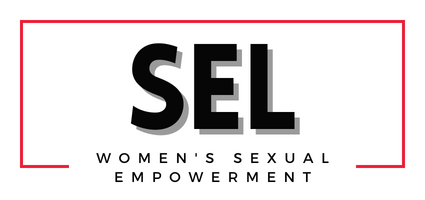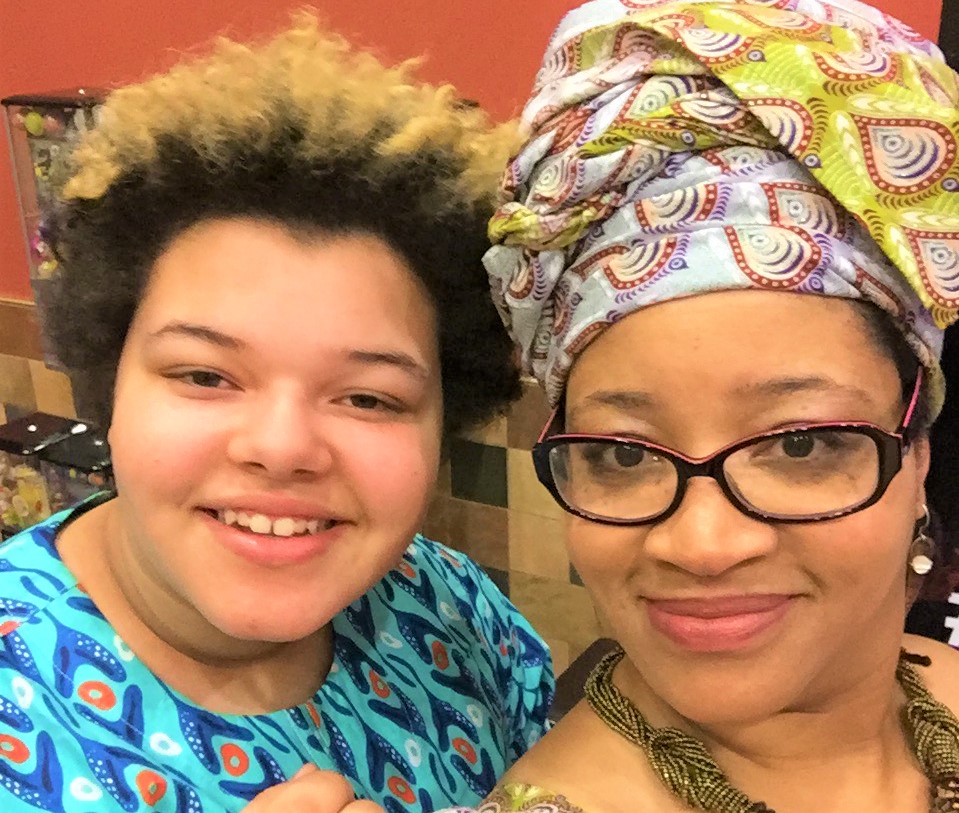Poet, Playwright, Activist, Mom & More: Lydia Valentine will Blow Your Mind
I knew when it came to shining a spotlight on this phenomenal Black Woman, there would be a lot to cover. And my Q&A with Lydia K. Valentine did not disappoint. I learned a lot, as I believe She Explores Life readers will too.
Lydia Valentine’s Bio
Lydia Valentine is a playwright and poet, director and dramaturg, editor and educator. However, according to Valentine, her proudest accomplishment is being a mom to two creative, intelligent, and caring individuals and activists. In her own writing and the projects to which she contributes through Lyderary Ink, Lydia Valentine seeks to amplify the voices of those who are often stifled, ignored, and marginalized in what has been the accepted narrative of the United States.
Lydia Valentine is the resident dramaturg for Empathos Company and Toy Boat Theatre, and she maintains ongoing partnerships with The Mahogany Project, Pork Filled Productions, and We Out Here. She has been invited by various organizations (including Central Washington University, the Hiatt Center for Civic Engagement and Leadership, Goddard College, the African American Writers’ Alliance, and Tacoma Public Libraries) to speak and run workshops on topics such as equity and classroom management, social justice in the classroom, intersectionality and identity, and -of course- poetry and playwriting.
Lydia Valentine teaches at Northwest Indian College and is the Learning Specialist for Seattle Girls’ School. She is also a highly sought after sensitivity reader and editor and has worked on publications such as the social justice and literary arts magazine Speak, books such as Rough House by Tina Ontiversos, and various projects for McGraw Hill and Agate Publishing.
Lydia Valentine’s writing has appeared in online and print publications such as Angels Flight * literary west, The Pitkin Review, and Shout! An Anthology of Resistance Poetry and Short Fiction, and HowlRound. Her first poetry collection, Brief Black Candles, was published in November 2020 by Not a Pipe Publishing. She has been the recipient of various awards and recognitions, including the Engaged Artist Award from Goddard College, runner-up poet laureate for Tacoma, WA, and as a poetry fellow serving Nuestras Pequeñas Rosas in San Pedro Sula, Honduras.
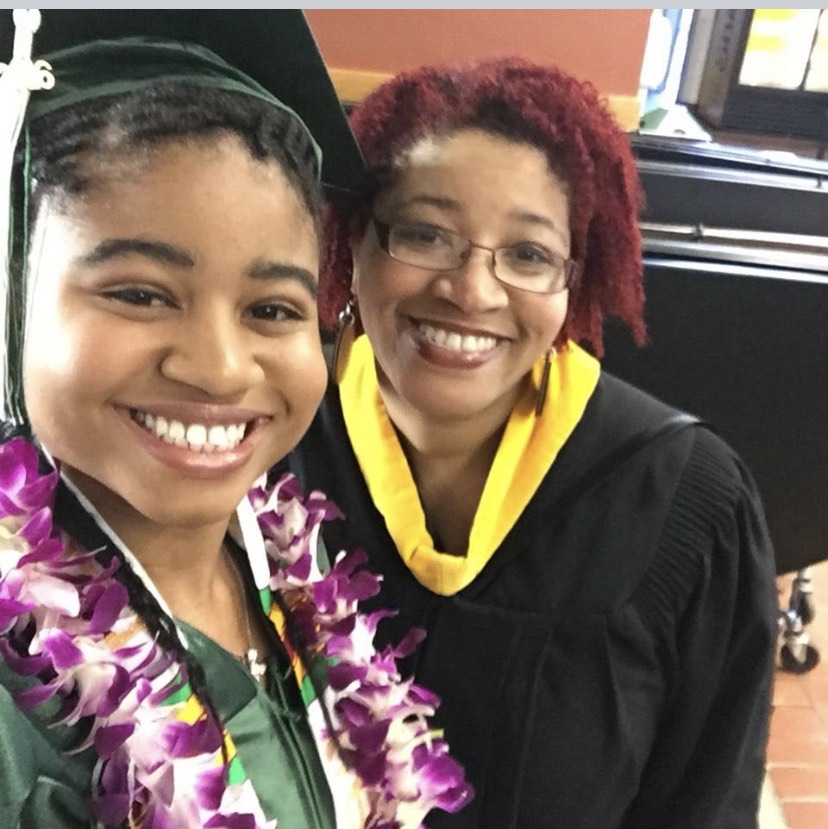
Q&A with Lydia Valentine
Lydia Valentine’s accomplishments and talents are many. My Q&A with her was incredibly insightful revealing precious insight into her work and her passion for social justice and equality, and raising the youth of today.
Lydia Valentine’s Poetry
Q: You are an educator, activist, poet, playwright, and mom. Could you share a little about the history of your love for writing? How did you end up writing poetry and becoming such an accomplished poet at that?
LV: I don’t think I qualify as an accomplished poet yet, but I definitely appreciate the sentiment! My love of writing started with the most passionate affair of my life: with reading. My mother was a prolific reader and passed that trait on to us, and I always tell my students that a great way to improve as a writer is to be a reader. My sisters and I grew up discussing and analyzing every nuance of characters and language that we loved-or hated! We’d write our own stories, but poetry was always more fun for me.
Q: How would you describe your poetry to our readers? If you had to pick the poem you’ve written that you wish people would read the most, which would it be and why?
LV: That is a tough question! I love to play with language: sounds, patterns, symbols; I think that’s obvious in my writing. Putting a poem or essay together well is a bit like constructing a puzzle. It’s a wonderful feeling to fit the pieces together properly! My poetry reflects my experience as a Black woman, as a mother and daughter, as an autistic, queer, blerd, all in a society that remains rooted in white supremacist, patriarchal, heteronormative, cisnormative, capitalistic structures. LOL! That sounds heavy, but I don’t think it is really. I hope my writing makes people think and question.
I LOVE the question about which poem I’d pick! That’s a tricky one! I probably would pick “In the Land of Now.” It’s a pantoum, a form it is fair to say that I am a bit obsessed with, and I love the imagery in it and the message.
Lydia Valentine’s Play
Q: You recently completed writing your first play Aliquippa, which has had readings at Empathos Company, can you share a little about that project?
LV: The focus of my MFA in creative writing (Goddard College) was dramatic writing, and “Aliquippa” was my thesis. It was definitely a labor of love. When I started the play, I had a very specific idea in mind. I was going to write about a disparate and diverse group of people in a grief support group and explore the individual suffering of grieving the loss of a loved one and, also, the collective yet isolated and isolating grief that those of us in the black diaspora have felt and continue to feel every time one of us is killed – both literally and through the stripping of our humanity.
When I sent my first scenes to my first-year advisor, playwright and poet Darrah Cloud, she gave me one of the best pieces of writing advice that helped me to find my rhythm to truly begin the play. It was, “You’re writing the play like it’s fiction. It’s not. Write it like it’s poetry.” That changed everything for me. I began to listen to my characters and followed their lead. My second-year advisor, Victoria Nelson, shepherded me through the development and completion of “Aliquippa.”
At the start of my last term, she thought I might need another semester in order to get it completely done. Once she shared that, I began firing on all cylinders because I did NOT have another $10,000 for an extra semester! Her book, On Writer’s Block, and the workshop she gave on the topic also helped tremendously.
The play also benefited immensely from an observation from another professor who was with Goddard at the time, Keenan Norris. I’d had a workshop with him, and he said, “I’m curious why you don’t start the play in Naomi’s house, since it’s her story.” That comment blew my mind because I truly had not realized that she was the protagonist!
The play is set in my hometown, Aliquippa, PA, a small city just north of Pittsburgh. Like Pittsburgh and many of the surrounding areas, steel mills were the root of Aliquippa’s economy and football was and is to this day the heart of the community. The character, Isaac, a former Quip who is now a star college football star on the precipice of being recruited into the NFL, was a part of every draft of the play and originally the protagonist. Then the story shifted to be more about his sister, Rachel, and her relationship with Isaac, their mother, Naomi, and grandmother, Mama Shirl. But, Keenan really brought some clarity to it for me by pointing out that Naomi really is the center.
Q: Did you always want to become a playwright?
LV: No. I honestly never considered it to be honest, and when I applied to Goddard, they thought I was going to pursue poetry, and – at the time, I did, too. But, I wanted to take advantage of having direct instruction and guidance from excellent faculty in a genre that I had never had the opportunity to study. As an enormous comic book fan, I wanted to study graphic novel, but unfortunately, the graphic novel faculty were at the Vermont campus, and I specifically chose the Goddard program because they had a Washington campus. It was a quick an easy shift to plays, though, because I love theatre and do a lot of work as a dramaturg, assistant director, and director.
Q: What have some of the biggest challenges you have faced along the way in your writing career?
Whew! Well, it took me awhile to call myself a writer. Going to Goddard was a major step. Prior to that, I had never sent any work out for submission calls. I wrote for myself. I am doing it more these days because I keep reminding myself that no one is going to show up at my door randomly asking to see my work, but it still takes a lot of time, thought, energy, and money! It’s expensive to send things out for submission! I understand it; literary magazines and small presses all need money to survive.
Going to Goddard also took money! As someone who is still being strangled by student loan debt and living on a teacher’s salary, it took a lot to be able to go to grad school. Before COVID hit, I decided to shift to part-time teaching with the plan to devote the other half of my time to my career as a creative – with the understanding that I would be living on peanuts. But for people like me without generational wealth or money from a lucrative day job, if you have time to be a creative, you have no money; if you have money (from working), you have no time. But life is too short, so here I am.
The other challenge to many aspects of my life is that I am a night owl, and I write best later in the evening. That’s not conducive to a schedule that starts at 5:00 or 6:00 am.
On Overcoming Challenges
Q: How did you (and are you working towards) overcome these challenges?
LV: There are some things that have worked out in such a way to enable me to work part time. Due to COVID, I am not commuting 2-3 hours a day roundtrip any more which has alleviated a lot of stress and lost time. My daughter has graduated college and is working full time, and my son graduated from the private middle school he was attending and is now in a public high school, both of which lessen financial constraints.
Lydia Valentine On Raising Kids While Writing
Q: As a writer and a mother, I’m in awe of your accomplishments. How has raising your kids while on your writing journey been? Highlights? Low lights?
LV: I took a year off of work the first year of my MFA program. My daughter, Kaia, was in her first year in college, so we weren’t traveling to and from high school sports and activities. Honesty, she has been my biggest champion along this writing journey. She has urged me on very step of the way. My son, Matt, was in his first year of Middle School in Olympia, about 50 minutes from where we lived in Tacoma, so I’d drive him to school in the am, go to a coffee shop or the library armed with noise canceling headphones, laptop, and chargers, and write. I also volunteered at his school a bit in the afternoons, then, when his day was over, I’d pick him up and we’d head on home.
When I returned to work, I had an hour-long train ride before a 20-minute bus, so I’d read and/or write during transit. Going from spending so much time together to getting home late in the evenings from work, not having any connection to his school, and spending hours writing in my room or working on theatre productions definitely impacted my relationship with my son. After I moved into my own place, he opted to live primarily with his dad, and they moved to Olympia to be closer to his friends and the high school they’d all be attending. It’s tough. I miss him every day. I just try to put work out in the world that could make him feel proud of me.
An incredible highlight is that both Matt and Kaia are gifted writers, and I am a tough critic! They both have won writing awards and have been published. Matt has recorded a couple of songs he co-wrote. Kaia is actively working on a collection of stories and two screenplays. She wrote a fractured fairy for me for Mother’s Day and surprised me with a ten-page essay, “Sheep Among Wolves” for my birthday… In an interview for Brief Black Candles, it came up that I have been finding it difficult to pray. In the intro, she said, “Somehow, that confession was the glue that connected the dots between many of the underlying themes of Brief Black Candles, our phone conversations, and my studies on America, Race, Gender, and the New Testament.” It’s a remarkable essay. I’d have been over the moon to receive it even if it wasn’t… but it is.
She interviewed me for my website when Brief Black Candles first came out, and we are doing a follow-up for my birthday. (Both can be found on lyderaryink.com, and also the Lyderary Ink YouTube channel.)
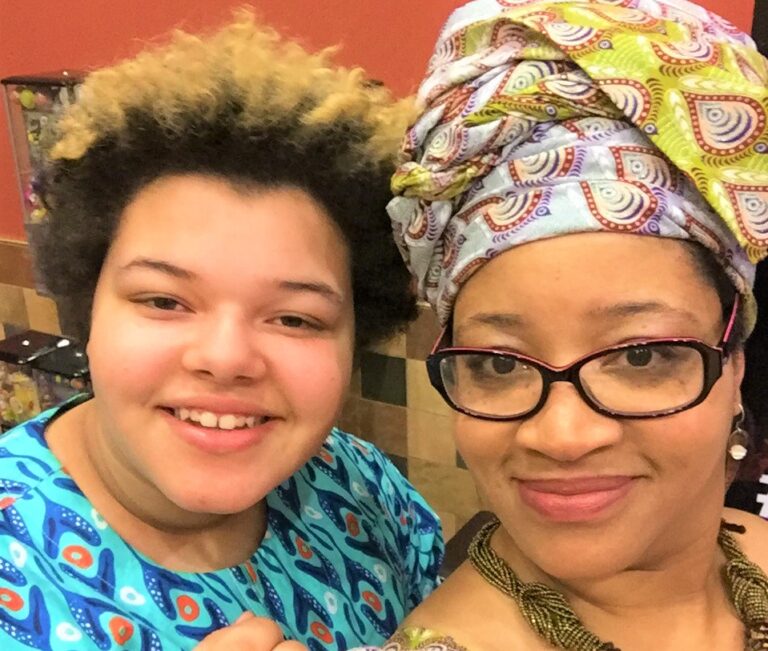
Lessons from Lydia Valentine’s Journey
Q: What have you learned from your journey that you would like most to share with others?
LV: My parents have both passed, as has my aunt who was like my big sister and second mom all together. A line from Hamlet brought me solace during my mom’s battle with cancer, and I try to keep it in mind when I’m struggling in any way, but in particular when I’m missing these three pillars of my life. It’s not hard because I have it tattooed on my arm. “There’s a special providence in the fall of a sparrow. If it be now, ’tis not to come. If it be not to come, it will be now. If it be not now, yet it will come—the readiness is all.”
Life is short. You owe it to yourself to stand in your truth every single day. To try to laugh or at least smile every single day. To put something positive in the world every single day. To keep people around you who support you in being yourself, laughing and smiling, and creating positivity. It might sound corny, but I call my house Chez Love and Light. Don’t let people bring negativity into your life; it’s hard enough to get through the day to day without that nonsense!
Lydia Valentine on the Current Social & Political Climate
Q: What are your thoughts and greatest concerns about the current social and political climate in the U.S?
LV: My greatest concerns about the current social and political climate of the US are the validation and normalization of hatred and apathy. Adults who sigh and shake their heads about the indignities and injustices in our country but who do not act (other than to repost or retweet) are almost as much of the problem as the people spewing vitriol and spouting racist, misogynistic, transphobic, homophobic, xenophobic, Islamophobic, anti-Semitic, anti-Asian, classist, sizist rhetoric. Period.
The people who wave off their friends and relatives’ slurs that slip out as errors slipping through from another era might as well be waving a white hood. I worry that with the results of the election people will once again become complacent and forget that we are the cavalry, and the battle isn’t over.
Last month, I read an article addressing the fact that the US Women’s Team would no longer be kneeling at the anthem, and that “the move to stop the kneeling gesture was a collective decision by a team ready to move past the protesting phase.” This is a direct quote from the article which focused primarily on player Crystal Dunn (who happens to be black because, of course, they had to have the sister publicly sign off on this shift).
Dunn was later quoted as saying, “Moving forward, we decided we no longer feel the need to kneel because we are doing the work behind the scenes.” All I could think was well, now, that must be nice! As if all of us who have been seeing our brothers and sisters and fellow citizens dying in the street and in their beds wouldn’t like to move past the protesting phase. As if those of us who see our children, nieces, nephews, and grandchildren in the faces of Tamir Rice and Aiyana Stanley-Jones wouldn’t like to be free of that need. As if hundreds and thousands of people haven’t been fighting against oppression and tyranny in this country for decades behind the scenes and in the streets at great risk to themselves and without a single accolade or newspaper article giving them national attention for doing what is right.
This is the kind of stuff that definitely is reflected in my poetry, in poems like “Speaking in Tongues,” “We Are the Cavalry,” and “Nightmares.” I have to write about these things to give a place for the bewilderment, fear, anger, frustration, and weariness somewhere to go. Otherwise, honestly, I don’t know if I would be able to stop myself from either staying in the bed with the covers over my head or running through the street screaming and knocking things down.
Q: What is your hope/vision for the future, if you could have things change in a particular direction?
LV: My hope is that we don’t stop forward momentum; that we continue (or in some cases START) to hold people (including our own selves) accountable for their actions and their words; that we pause before we act or speak and consider if our deeds and words are promoting positivity, are furthering equity, inclusion, and access.
It’s not entirely relevant to this question, but I have three quotes that I have had as a part of my email signature for many, many years, and they reflect my deepest beliefs and who I am at my core. Two of them, one from Bishop Desmond Tutu and one from Harvey Fierstein, are somewhat related to this question because I think that if people kept them in mind, the world really would be a better place. They are:
“If you are neutral in situations of injustice, you have chosen the side of the oppressor.”
– Bishop Desmond Tutu
“The real point is that you cannot harbor malice toward others and then cry foul when someone displays intolerance against you. Prejudice tolerated is intolerance encouraged. Rise up in righteousness when you witness the words and deeds of hate, but only if you are willing to rise up against them all, including your own. Otherwise suffer the slings and arrows of disrespect silently.”
– Harvey Fierstein
The third quote isn’t a bad one, but I know it doesn’t resonate with as many people as it does with me, and I don’t hold that against them (much)! Just kidding!! It is:
“When I get a little money I buy books, and if any is left, I buy food and clothes.”
-Desiderius Erasmus
Lydia Valentine on Activism & Social Justice
Q: Could you share about the activism and social justice work you’ve done and what you’ve experienced?
LV: A big part of activism is educating others and standing in one’s own truth. I have worked with many people to help them shift their way of thinking in how they view others and the feelings of confusion, anger, and sadness in dealing with circumstances they never imagined, such as being or having kids who are neurodiverse, gender nonconforming or somewhere else on the LGBTQIA spectrum, or differently abled. If people start out from a place of openness in accepting people in all their forms (instead of having a predetermined idea of what form they should or will take), it makes life a lot easier and happier.
To start having hard conversations and encourage people to move toward action, a fellow congregant and I started a social justice book discussion group (loosely called Citizen Discussion Group because that is the first book we read and discussed).
After being invited to take part in a discussion around DEI in South Sound Community Theatre and finding it lacking, I noted my frustration at having spent 45 minutes listening to mostly white participants patting themselves on the back for what they were doing and not getting to a place to examine needs not being met.
I used an analogy that I got from my friend, educator and DEI consultant Rosetta Eun Ryong Lee. While many people and organizations are just starting to get serious about DEI work and are, therefore, at about addition or multiplication level, BIPOC are functioning at a calculus level, so it is frustrating to tread water in meetings and discussions about being in and being fine with staying in addition and multiplication.
The other BIPOC in the meeting and I went on to meet on our own, and we have started Rise Up! Theatre Coalition: a BIPOC Path Towards Action for Theatre Makers. Our mission is to advocate and be a resource for Black, Indigenous, and People of Color who identify as theatre makers and educators. While honoring our ancestral traditions of storytellers, we amplify anti-racism and inclusion, confront tokenism and alienation, and create a safe and thriving community for performing artists in the South Puget Sound.
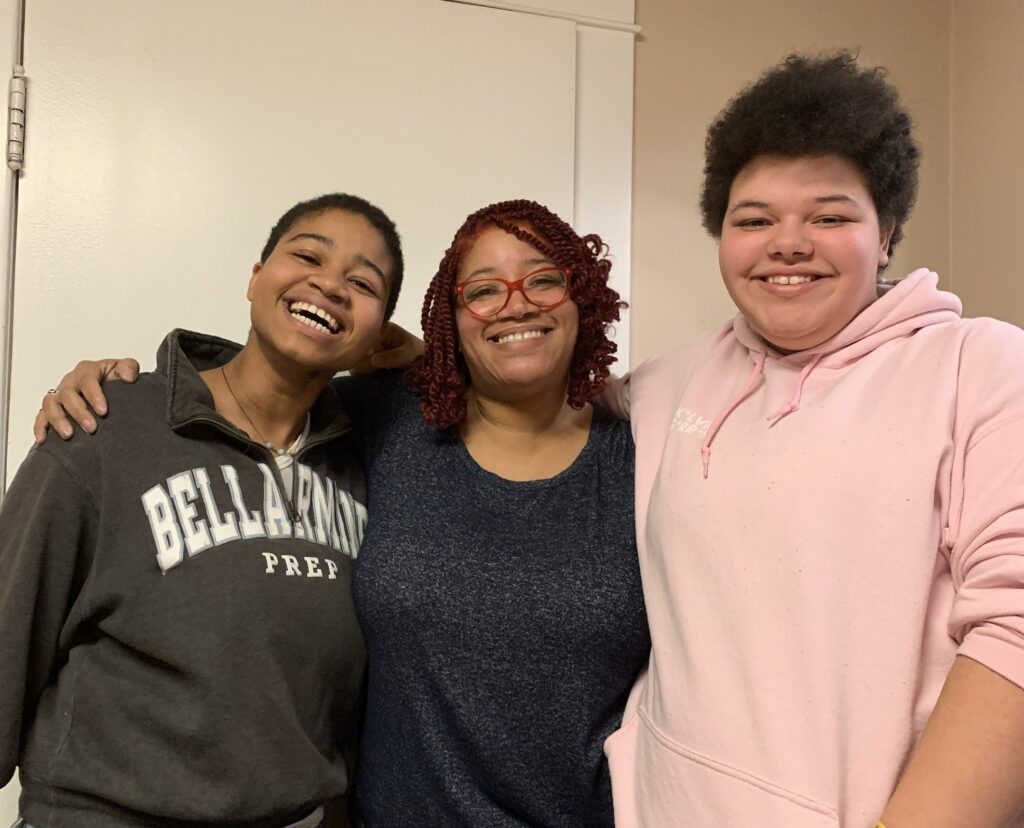
Lydia Valentine On Parenting
Q: If you could educate the general public about anything, what would it be?
I feel that often adults who parent approach the task in the wrong way. What I mean is that parental figures interact with youth as if the adults are bestowing upon them their personality, their personhood, and their place in the world. Children’s ideas and opinions are so often ignored or brushed aside as cute (cue laugh track) and inconsequential or precocious (cue eye rolls) and inconsequential. What an arrogant mindset. Kids are actually whole human beings already. They have an innate understanding of who they are as whole people. Listen to them. Trust them.
Shaping kids’ personalities and spoon feeding them what they think simply is not the job. It’s also one of the reasons that so many people–kids and parental figures–have so much heartache related to kids not “turning out to be” the people parental figures think they should be. Too often that person is a manifestation of the parent’s hopes and dreams, two things that do not always have anything to do with the reality of the child, the whole human, they have had in their life all along.
The end goal of parenting is to have an adult, which means that the job is guiding kids in knowing:
1) how to respect themselves, other people, and the world we live in
2) how to honor their feelings and those of others (while not taking on the burden of responsibility for others’ feelings),
3) and how to think for themselves and maintain their own agency.
Instead of making choices for them, lay out the choices that they have, then shut up and listen, or ask open-ended questions. Let them talk through their options and the possible consequences for them. Instead of automatically imposing your opinion, ask if they need any help or want to hear your thoughts. I know that a lot of people get this, for sure, but the trouble is that they start doing this when they think the kids in their care are “old enough” to make decisions. No. This is the job from the beginning because life is always about making good choices.
The second day that I picked up my daughter from Kindergarten, her teacher said, “I’d like to give you a call this evening.” I’m a teacher. I know what that means. I asked Kaia if anything had happened at school. She said no. I reminded her that it was always going to work out better if she told me about anything that happened before someone else had to tell me. She assured me that she knew and that nothing to her knowledge had happened.
When her teacher called, she told me that Kaia would not help to clean up at the end of the day. I was immediately taken aback because my kid was and is a pretty respectful person. I said as much to the teacher, a woman roughly twenty years older than my twenty-six years, who had raised her own children to adulthood before taking her first job as a teacher in the girls’ school that she had attended in her youth. The reply still makes me smile to this day. She said, “Oh, she’s very polite about it! When I ask her if she is ready to clean up, she always answers, ‘No, but thank you for asking!’” I tried to explain that I was raising my daughter to understand that when she is given options, the choice she makes will be respected. What the teacher said next will never make me smile. She replied back, “Well, the other girls know what I mean when I ask that!”
I told her that if she wanted Kaia to clean up she could tell her it was time to clean up. She thought that was rude. I offered the suggestion that she give her a real choice with options that the teacher could live with, such as, “Would you like to clean up the blocks or would you like to clean up the dolls?” She thought that was too much like bargaining. See, she wanted Kaia to respect her authority without respecting Kaia’s agency and critical thinking skills. Kaia was a child, after all!
Two days later, the teacher, her assistant, and I were having a conference with the school psychologist. The teacher thought the woman, older than both of us, would surely take her side. The psychologist smiled at both of us, turned to the teacher and said, “It sounds like Kaia doesn’t take you seriously. And how can she when you say one thing, but you mean another?”
It felt pretty good to leave that office after the psychologist told the teacher the same things I had been telling her, but it was a rough year. The teacher was not the only person who looked at me askance or made commentary about the way that I was raising my daughter, both in regard to the authority I allowed her to have over her choices, and the impartial way that I allowed her to bear consequences.
I really meant it when I told her and my nephews as we were having dinner with my sister before we all went to Disney on Ice, “This is what we’re having for dinner. You can choose to eat now, or you can choose to eat when we get back. I am not going to buy expensive snacks and drinks at the show.” My sister was flabbergasted two hours later when she suggested that we go to the concession stand to get treats for the kids and I passed. Kaia wasn’t. She also wasn’t hungry like the boys were because she had eaten her dinner. She was three.
I’m not saying I do everything right in the least; please don’t get me wrong. I make mistakes with the best of them. I do know, though, that waiting until kids get their driver’s licenses or head off to college is way too late to start thinking about giving them the tools they need to be adults. By that point, a rhythm and routine around decision making should already be long established, and instead of being anything like a helicopter parent or snow blower parent, people should be pretty comfortable in the role of consultant. Kids don’t wake up at 18 or 21 automatically successfully rewired for adulting, and they shouldn’t have to spend a decade (or more) stumbling through figuring out the things that their parents should have been helping them to understand throughout their childhood and adolescence.
As I have said ad nauseam to the kids in my life, “Life is all about choices.”
You can find out more about Lydia Valentine online at: lyderaryink.com
Or follow her social: @lydkrob

